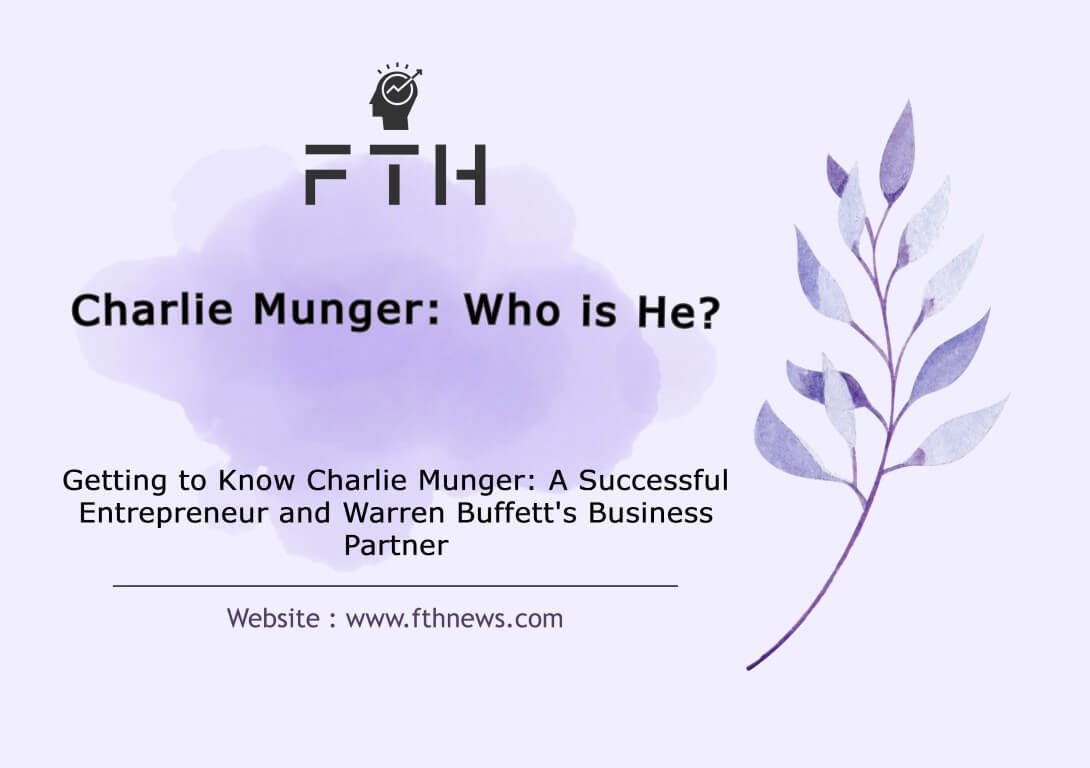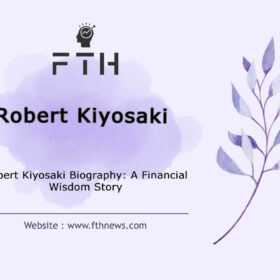
Getting to Know Charlie Munger: A Successful Entrepreneur and Warren Buffett’s Business Partner
Charlie Munger, a name synonymous with wisdom and success in the world of finance, is a man of many facets. As the Vice Chairman of Berkshire Hathaway and the long-time business partner of Warren Buffett, Munger’s life and career offer a treasure trove of insights. In this blog post, we will journey through the remarkable life of Charlie Munger, exploring his wisdom, success, and enduring influence on the world of investing.
Many of us often ponder the paths to progress and wealth, seeking the most effective ways to succeed in our endeavors. To glean valuable insights and make more efficient use of our time and talents, we should learn from exceptional individuals.
In this article, we invite you to acquaint yourself with one of the world’s most remarkable and influential figures Charlie Munger.
Who is Charlie Munger?
Charles Thomas Munger, an American investor, entrepreneur, and former real estate attorney, currently holds the position of Vice Chairman at Berkshire Hathaway, the conglomerate under the stewardship of Warren Buffett, who affectionately refers to Munger as his life partner.
From 1984 to 2011, Munger served as the head of WESCO Financial Company. He also presides over the Daily Journal Corp, headquartered in Los Angeles, California, and serves as a director for the wholesale giant, Costco.
Charlie Munger’s parents instilled a love for reading within him from an early age. Holidays saw them amassing books for their children, stoking young Charlie’s passion for literature.
As Charlie matured, his interests shifted from literature to mathematics and then to physics. He initially pursued these fields but ultimately decided to follow in his father’s footsteps, leading him to Harvard University to study law.
Prior to his legal studies at Harvard, Munger attended the University of Michigan, the California Institute of Technology, and various other colleges. His educational journey was interrupted by World War II when he served in the United States Army Air Force.
Upon relocating to California, he entered the legal profession and subsequently founded his own law firm. Munger excelled in this domain but later transitioned into real estate development.
In the early 1960s, he embarked on an investment career, with his most significant association being with Warren Buffett. By 2020, Munger’s estimated net worth had reached nearly $2 billion.
From any perspective, Charlie Munger has enjoyed a remarkably successful and enduring life. At nearly a century old, he has eight children.
The Remarkable Partnership with Warren Buffett
In 1959, Charlie Munger and Warren Buffett had a fateful meeting in Omaha, Nebraska. Over dinner at a local café, the two quickly formed a strong bond. Interestingly, they both began their professional journeys as teenagers, working at Warren Buffett’s grandfather’s grocery store. Today, they stand as not only business partners but also the most prominent and influential figures in the realms of investing, market forecasting, and the development of mental models. Their names are synonymous with commercial success and wisdom in the world of finance.
Charlie Munger’s contributions to Berkshire Hathaway have been monumental, with his investment acumen and financial wisdom complementing Warren Buffett’s. Their partnership is a testament to the power of collaboration and a shared commitment to long-term value creation. They have consistently applied a set of principles and mental models that have guided their investment decisions, earning them both incredible wealth and recognition.
In addition to their financial achievements, Munger and Buffett are known for their ethical and moral principles. They’ve set an example for the business world by adhering to honesty and integrity, emphasizing the importance of treating shareholders and business partners fairly.
In conclusion, understanding the life and career of Charlie Munger provides invaluable lessons in the fields of investing, business, and personal development. His journey from a young boy with a love for books to a billionaire investor is an inspiring story of dedication, curiosity, and lifelong learning. Charlie Munger’s impact on the world of finance is immeasurable, and his partnership with Warren Buffett has created a legacy of success that continues to influence investors and entrepreneurs globally.
The Influence of Charlie Munger
Charlie Munger’s perspective on benevolence towards people is both insightful and profound. He asserts, “Each of us who has been lucky in life has a duty to give his religion to the people.” This statement prompts interesting questions: What is philanthropy? How does it differ from charity? Are there actions that qualify as “religion” but may not be entirely benevolent, and how can one best practice their religion?
Philanthropy and its Distinction from Charity
Philanthropy encompasses the desire to promote the welfare of others. The word itself is derived from the ancient Latin “philanthropia,” a fusion of the terms “to love” and “human being.” Philanthropy goes beyond simply providing material assistance; it encompasses a broader commitment to improving the well-being and circumstances of individuals and communities.
Charity, on the other hand, often entails giving money, food, or other resources to non-profit organizations to aid those in need. It typically involves acts of mercy and compassion, providing immediate relief to the less fortunate.
The Essence of Philanthropy
The essence of philanthropy lies in empowering others to improve their lives. It involves not only alleviating immediate suffering but also offering guidance, knowledge, and opportunities for self-improvement. When you teach someone how to earn money or inspire them to make positive changes that enhance their well-being and comfort, you are embodying the concept of philanthropy. It’s akin to the proverb, “Give a man a fish, and you feed him for a day; teach a man to fish, and you feed him for a lifetime.”
Charlie Munger is a proponent of philanthropy and places it at the forefront of his beliefs. He recognizes the profound impact that helping others help themselves can have on society.
A Vision Beyond Small Acts
Mark Zuckerberg once articulated his vision, emphasizing the importance of actions that have the potential to scale and effect broader, systemic change. While small, visible acts of charity, such as feeding the hungry or giving money to the poor, undoubtedly make a difference in the lives of individuals, they may not have the same transformative power to change the world.
Both Munger and Zuckerberg’s perspectives underscore the significance of philanthropy as a means of fostering lasting, meaningful change in the lives of those less fortunate. Encouraging self-sufficiency, knowledge, and empowerment can have a far-reaching impact, enabling individuals and communities to create sustainable improvements in their circumstances. It is a powerful reminder that philanthropy, when practiced effectively, has the potential to shape a better world for all.
How does Charlie Munger feel about this?
Charlie Munger’s perspective on these matters is both pragmatic and insightful. He values actions that, while not strictly philanthropic, provide significant benefits to society.
Munger acknowledges that endeavors like teaching job skills or promoting accessible, environmentally friendly energy sources are not traditional forms of charity. Instead, he views them as beneficial activities that align with business interests. He praises companies like McDonald’s and Costco for their contributions in these areas. While their primary goal is profit, their actions have a positive societal impact.
It’s essential to recognize that activities like investment, although primarily profit-driven, can still bring about meaningful changes in the world. Munger implies that these actions don’t fit neatly into the category of charity because they are market-oriented. However, they are valuable to society and may be described as forms of socially responsible or impactful work.
Munger’s philosophy, as expressed in his quote, “I just wanted to do the best I could with the talent, time, and resources I had,” emphasizes a practical and opportunity-driven approach. He views the concept of opportunity cost as central to his decision-making. In essence, he strives to make the most of his abilities and resources for the greater good, weighing the trade-offs and costs associated with different choices.
The best term to describe these activities may be “socially responsible business practices” or “impact-driven initiatives.” These terms acknowledge the dual nature of these actions: they serve business interests while also bringing about positive changes in society. Ultimately, Munger’s philosophy emphasizes that one can contribute to the betterment of the world not only through traditional philanthropy but also by leveraging business and investment as vehicles for social progress.
What is special about Charlie Munger?
Charlie Munger’s distinctiveness lies in his multifaceted approach to philanthropy, self-awareness, and commitment to society. Here are some of the remarkable aspects of his character:
1. Progressive Philanthropy: Charlie Munger has made substantial contributions to various organizations, demonstrating a deep commitment to philanthropy. His donations span across healthcare, education, and social services, showcasing a diverse range of interests.
2. Timely Giving: Munger’s choice to donate a significant portion of his wealth during his lifetime underscores his proactive approach to philanthropy. He believes in actively reducing his net worth to make a meaningful impact while he’s still alive.
3. Moral Duty Beyond Money: Munger’s belief in a broader moral duty, especially for individuals with unique skills or talents, reflects his commitment to giving back to society. He acknowledges that monetary contributions are only one aspect of fulfilling this duty.
4. Self-Reflection and Humility: Munger’s candid acknowledgment of the limitations of his financial success and the importance of contributing to society highlights his humility and self-awareness. He feels a sense of shame about not having done more and aims to inspire others to create a positive impact.
5. Educational Investment: His support for educational institutions like the University of Michigan and the Harvard-Westlake School underscores his dedication to providing opportunities for learning and personal growth.
6. Teaching by Example: Munger considers his philanthropic efforts and approach to life as a form of teaching and atonement. He serves as an example of how individuals can make a difference by actively participating in improving society.
Charlie Munger’s distinctive character is exemplified by his blend of financial success, philanthropic zeal, self-awareness, and his commitment to encouraging others to contribute to a better world through their unique talents and resources.
Starting the Learning Journey: Three Key Points Emphasized by Charlie Munger
When embarking on a journey of learning and personal growth, there are several fundamental principles that Charlie Munger highlights as essential for making significant changes in one’s personal and social life. Here are three key points that Munger emphasizes:
1. Recognize Your Abilities and Talents:
Understanding your unique abilities and talents is of paramount importance. Munger stresses that it’s crucial to identify where your strengths lie and make a conscious effort to harness and apply these talents. Trying to excel in areas where you lack natural aptitude can lead to dissatisfaction and unfulfillment.
Munger’s own life journey is a testament to this principle. He spent years searching for a career that would fully utilize his talents. Before joining Berkshire Hathaway, he founded his own law firm. However, his clients’ investment decisions, not legal matters, captured his interest, ultimately leading him to the world of investing.
It was Warren Buffett, Munger’s longtime friend and Berkshire Hathaway’s CEO, who encouraged him to make the transition. In Buffett’s view, the field of law didn’t fully leverage all of Munger’s talents. This realization was a pivotal moment in Munger’s life.
Furthermore, Munger applies this principle to his investment philosophy. He and Warren Buffett only invest in businesses that they thoroughly understand and in which they have a high level of expertise. This approach underlines the importance of aligning your investments with your skills and proficiencies.
Recognizing your talents not only leads to personal fulfillment but can also inform wise decisions in various aspects of life, including investments and career choices. It’s the first step toward a more purposeful and rewarding journey of learning and growth.
Learning from Mistakes: A Key Lesson from Charlie Munger
Charlie Munger places great value on the ability to learn from and overcome mistakes. His journey is a testament to his capacity to acknowledge errors, adapt, and move forward. Here are some key insights on this aspect of his philosophy:
1. Embrace the Inevitability of Mistakes:
Munger acknowledges that making mistakes is an inherent part of life. No matter how knowledgeable or experienced one becomes, errors are unavoidable. Accepting this fact is the first step in dealing with mistakes in a constructive manner.
2. Learn from Mistakes:
Munger encourages learning from mistakes as a means of personal and professional growth. While it’s impossible to eliminate all errors, it is possible to make fewer mistakes than others and correct them more swiftly. This proactive approach to self-improvement is at the heart of Munger’s philosophy.
3. Know When to Cut Your Losses:
Recognizing when to let go of a project or idea that is not progressing is a crucial skill. Munger emphasizes that clinging to a failing endeavor due to psychological denial can be detrimental. The more you invest in terms of time, effort, or resources, the harder it becomes to accept that your initial expectations were wrong.
4. The Danger of Denial:
Munger highlights the common human tendency to engage in psychological denial when facing failure. You may be deeply committed to a project, and the more you invest, the stronger the belief that it will eventually succeed. This denial can hinder your ability to adapt and move forward, potentially leading to stagnation or failure.
5. Destruction of Popular Ideas:
Munger’s success is often attributed to his willingness to challenge and deconstruct prevailing ideas. He is not afraid to go against the grain and question conventional wisdom. This willingness to break from the herd is a significant factor in his achievements.
In summary, learning to navigate and grow from mistakes is a fundamental aspect of Charlie Munger’s philosophy. His insights underscore the importance of humility, adaptability, and a willingness to challenge the status quo as key elements in achieving personal and professional success.
“I Don’t Know” is an Acceptable Answer: Embracing Humility in Learning
Charlie Munger’s philosophy champions the notion that it’s perfectly acceptable to admit when you don’t know something. Here’s an improved version of this section:
1. Acknowledge the Limits of Your Knowledge:
No one is expected to possess all-encompassing knowledge. It’s essential to recognize that there are boundaries to one’s expertise and understanding. Embracing this limitation is a sign of wisdom.
2. Embrace the Power of “I Don’t Know”:
When confronted with questions or situations where your knowledge or qualifications are lacking, do not hesitate to respond with “I don’t know.” This simple phrase reflects not just honesty but also a keen awareness of your own boundaries. It is a testament to your humility and maturity.
3. Avoid Overconfidence:
Munger wisely warns against the type of individuals who confidently answer questions on topics where they possess no genuine knowledge. Overconfidence can be detrimental, hindering personal growth and learning. By pretending to be an expert in all matters, you unwittingly build a wall around your mind, isolating yourself from the vast realm of knowledge.
4. Foster a Growth Mindset:
Saying “I don’t know” isn’t a confession of inadequacy; it’s an invitation to learn and expand your understanding. It signals your willingness to grow and discover more about the world. It’s a reminder that the path to knowledge is lined with the recognition of the vast unknown.
1. What is the most important character trait that we can have as an investor?
Munger’s Answer: Patience is the most important character trait for an investor. He highlights the value of patient, meticulous behavior when seeking the best investment opportunities. While patience is essential, it should be followed by an assertive approach when the right opportunity arises. In essence, it’s about being patient in the pursuit of the right investment and then acting decisively when it presents itself.
2. What is the type of business you want to invest in?
Munger’s Answer: Munger’s response humorously simplifies the criteria for investing in a business: they prefer businesses that generate profits and can provide returns to their investors. This succinct answer emphasizes the importance of investing in financially sound and profitable enterprises.
3. With all the books written on how to invest in other ways, why is your style of investing the most effective?
Munger’s Answer: Munger attributes the effectiveness of his investment style to the nature of the investment industry. He suggests that the profession has attracted individuals with higher IQs because it was not initially seen as a promising field. While access to investment information has improved over time, human behavior in the investment arena remains consistent. People’s psychological responses to the market and related issues remain relatively unchanged.
Munger believes that successful investing requires setting one’s mindset apart from the crowd. Herd mentality can hinder clear thinking and decision-making. Munger suggests that intelligence alone does not guarantee success as an investor. To be successful, one must resist the fear and greed exhibited by the crowd, even though it’s a formidable challenge.
4. What is the most important thing you think about when deciding to buy shares or a business?
Munger’s Answer: When purchasing shares (which represent a small part of a business), their analysis closely resembles the process for buying an entire business. The primary consideration is whether they can reasonably estimate the future income for at least the next five years. If they can, they will buy the stock or business if it’s priced reasonably relative to the lower end of their estimate. If they cannot estimate future revenue, they move on to other opportunities. It’s crucial to stay within their circle of competence, focusing on areas they understand.
5. Why do you only buy a few shares? Why not 50 shares?
Munger’s Answer: Munger prefers to invest a substantial amount of money in a smaller number of stocks rather than buying numerous shares. This approach avoids over-diversification, which can lead to an unbalanced portfolio. Instead, he concentrates his investments in businesses that he thoroughly understands and believes in.
6. Can people with normal intelligence invest like you?
Munger’s Answer: Munger suggests that you don’t need exceptional intelligence to succeed in investing. Rather, you should avoid common mistakes and exhibit a degree of wisdom. He emphasizes that, in the field of investing, it’s often more about not doing the wrong things. Seeking straightforward, sound decisions can be challenging but is essential for success. The key is not to be stupid, rather than striving to be extraordinarily smart.
Munger’s responses highlight the importance of sticking to what you understand, concentrating investments, and avoiding common mistakes, which are attainable goals for most investors.














